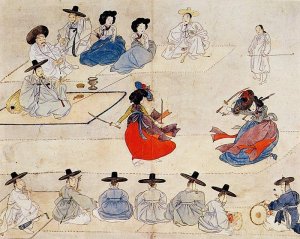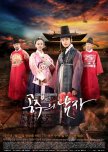Generational divides are a drama staple, but few versions of the trope are as high stakes as the one presented in The Princess’ Man. The aristocrats at the heart of the show vie for power knowing that they are risking not only their own lives but the lives of their entire families on the success of their schemes. Their plots are complicated further by the fact that the desires and allegiances of their children often diverge greatly from their own. The initial episodes take full advantage of the moral quandaries created by this zero sum game, as characters are forced to choose between friends and family, parents and lovers, ambition and affection. With the addition of sumptuous, jewel-toned cinematography and solid acting, things get off to a great start.
Alas, for all the lovely visuals and promising set-ups, the screenplay soon runs into issues. Few things frustrate me more than when characters act in ways that are convenient for the writer but fly in the face of common sense. Once the bloodshed begins, the characters appear to lose brain cells along with hemoglobin, making stupid choices that often seem directly at odds with their stated goals. If you’re looking for carefully crafted revenge schemes, you’ve come to the wrong show. Complex characters and decisions get dumbed down, and “Daddy doesn’t like my boyfriend” is treated as a crisis equivalent to “Dozens of innocent people may die today.” I personally found the secondary couple’s story arc much more compelling, if less swooningly romantic, than that of the leads, in large part because it seemed more grounded in the real world.
Finally, I wish the show had been willing to tackle the difficult questions raised by the historical events it draws on. This is a drama that has no place for the inconvenient truth that Suyang, for all his ruthlessness, turned out to be an excellent ruler, or for the idea that the welfare of a nation might matter more than the suffering of the elites. The period offers fertile ground for exploring if and when ends justify means, but the writer ultimately settles for easy heroes and villains. All in all, there’s a lot of flair, but far less substance than I hoped for.
Was this review helpful to you?

























